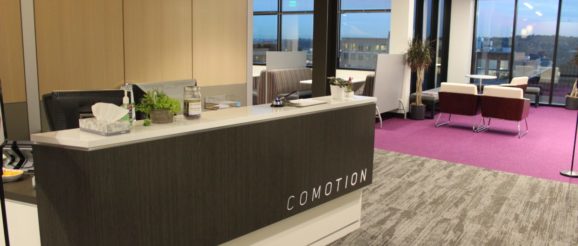Univ. of Washington’s CoMotion innovation hub closes public access to makerspace and part of HQ


The University of Washington’s CoMotion innovation hub has quietly announced that it’s closing public access to its MakerSpace and shrinking its headquarters, which launched with fanfare just three years ago as the region’s only incubator focused on virtual and augmented reality startups.
UW officials said their primary obligation is to serve the students, staff and faculty of the university and that their needs will continue to be met. The changes, said CoMotion director François Baneyx, are driven in part by the creation of three new student-focused makerspaces on campus. The reorganization will create efficiencies and “synergies” with other UW initiatives.
“We’re taking a holistic view to different things. We don’t see it as cutting services,” said Baneyx, who became the leader of CoMotion in August.
The closure will cut off the public’s access to a unique makerspace and cutting-edge technology, including VR and robotics equipment. Some in the entrepreneurial community are decrying the changes.
“We saw that as really being the draw — having the public access to those tools and resources. That is so key,” said Elizabeth Scallon, former director of CoMotion Labs for five years.
When it comes to providing those tools for innovation, if it’s “not CoMotion, who is going to do that for the state of Washington? No one is,” said Scallon, who left the center in 2018 to lead WeWork Labs.
CoMotion started in 2009 as the Center for Commercialization (C4C), which focused on helping UW researchers launch startups and secure patents for their discoveries. The UW is frequently lauded for its leadership in research. This fall, Reuters crowned it the most innovative U.S. public university — the third year the Seattle-based institution has landed the top spot. The UW is also No. 1 among public universities for the amount of federal money spent annually on research and development.

C4C evolved into CoMotion and its mission expanded into a collaborative hub for faculty and students. In 2015, the 6,000-square-feet CoMotion MakerSpace opened with 3D printers, laser cutters, electronics fabrication, sewing machines, AR/VR, woodshop and other resources. CoMotion @ HQ launched the year after with a celebratory event including former Washington Gov. Christine Gregoire.
CoMotion has faced challenges in the last few years. In 2017, CoMotion laid off 15 percent of its staff, a move attributed to the expiration of some money-generating UW technology patents. This past February, Vikram Jandhyala, UW’s former vice provost of innovation who took over CoMotion in 2014, passed away.
In July, CoMotion announced Baneyx as his replacement. Baneyx is currently the Charles W.H. Matthaei Professor of Chemical Engineering; director of the Center for the Science of Synthesis Across Scales; and an adjunct professor of bioengineering. He has held several leadership positions across campus since arriving in 1992.
The recently announced changes at CoMotion include:
- Closing the MakerSpace in the UW’s Fluke Hall in December, and turning it into a CoMotion Labs incubator and “clean room” for prototyping new devices; the space is being developed in partnership with the College of Engineering and the Washington Nanofabrication Facility (WNF).
- Vacating CoMotion Labs @ HQ at the end of January. CoMotion members in the HQ will move to existing incubation spaces in Fluke and Startup Hall, as well as the soon-to-be renovated MakerSpace. CoMotion business and operations staff will remain in the HQ building, located on Roosevelt Way in the University District.
- Moving student-funded equipment currently in the MakerSpace to three student-focused makerspaces at sites around the Seattle campus.
CoMotion’s Baneyx would not say if budget constraints were a factor in the changes.
The three CoMotion Labs incubators prioritize serving UW-affiliated startups, but accept non-UW entrepreneurs on a space-available basis, said a CoMotion spokesperson. Benefits for CoMotion Labs members will not change and include access to office space, training, mentoring, networking, equipment use and funding opportunities.
The general public will still be able to attend some CoMotion events.
“We are the University of Washington,” Baneyx said. “We need to prioritize what our researchers and students want, but we want to create a sense of community.”
Others in the entrepreneurial sector say the makerspace arena is already too limited. Companies like Amazon and Microsoft have their own in-house makerspace resources with limited public access, said Jeremy Hanson, founder of Seattle Makers.
Regarding the UW announcement, “I think it’s an awful decision,” Hanson said via email. “I’ve been a huge advocate for public availability to makerspaces, so much so that I ended up starting my own, built a team of volunteers to keep the price affordable, and built our business model to include revenue from team building events from local businesses,” so that members didn’t have to carry the full costs.
Scallon raised the issue of fairness and the digital divide.
“There are big disparities in tech, so how do we make sure there is a pipeline of talent that is being engaged with the latest technologies?” she said. “Making is the beginning of entering into the innovation ecosystem.”
